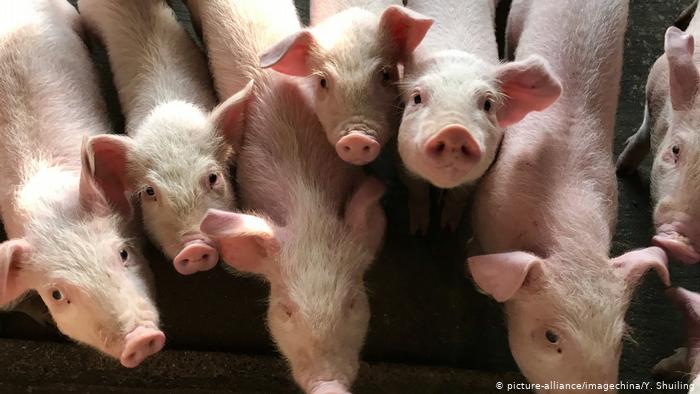 While ASF is not a threat for Indonesian people, FAO said that it is a challenge to tackle ASF in the ASEAN country with the fourth-largest population in the world. (Image via DW)
While ASF is not a threat for Indonesian people, FAO said that it is a challenge to tackle ASF in the ASEAN country with the fourth-largest population in the world. (Image via DW)
African Swine Fever is not contagious to humans: Source
From China to Indonesia, African Swine Fever (ASF) has slaughtered pigs, leading to exorbitant pork prices. Not only the price but also many people are afraid to contract the disease after eating pork. Rest assured, ASF, caused by double-stranded Asfarviridae virus, does not affect humans, only swine.The swine are prone to ASF after contacting with other infected swine, alive or dead. Also, swine are exposed to the virus in their contaminated feed since Asfarviridae has strong environmental resistance. In its acute stage, the mortality rate is 100 percent, while for sub-acute, the mortality rate is only 30 – 70 percent
Fortunately, until now, there is no human case of ASF as reported by the World Organization for Animal Health (OIE).
However, until now, there has been no antidote nor vaccine to tackle the disease.
ASF also caused economic and production loss for certain countries, leading to the pork prices hike. China was the first Asian country to catch the ASF. Beginning its outbreak in China in 2018, some countries such as Cambodia, Vietnam, South Korea (S. Korea), North Korea (N. Korea), Laos, Myanmar, and the Philippines already caught the ASF.
Indonesia also caught the unprecedented swine disease recently. In North Sumatera, about 27,000 infected swine had been culled. However, to this day, about 1,000 – 2,000 swine died daily due to ASF. According to Indonesia's Ministry of Agriculture, about 16 regencies and cities in Sumatera had caught ASF.
United Nations’ (U.N’s) Food and Agriculture Organization (FAO) stated that it collaborated with the world’s governments to tackle ASF, but Indonesia has its own obstacles. Compared to China that breeds and keeps its swine in an organized, factory-like environment, Indonesia keeps its swine unorganized, keeping them in small cages and selling them directly to the market. Hence, FAO said that the virus can spread easily.
Source: https://bit.ly/2MyDYU0
 English
English Japan
Japan

sildenafil vs sildenafil citrate top 5 birth control brands tadalafil 60 mg generic india what is viagra walmart coupons 10 off order fda weight loss medications
plaquenil causing acneblisters hydroxychloroquine plaquenil cost does plaquenil effect healing after bone surgery how long will plaquenil stay in your system
legitimate canadian pharmacy - canadian mail order pharmacy walmart online pharmacy
azithromycin 500 mg buy zithromax online without a prescription can you take ibuprofen with azithromycin what not to take with azithromycin
lasix tinnitus buy lasix cheap furosemide or lasix is used as where to buy lasix furosemide
generic tadalafil 20 mg canada - buy cheap tadalafil viagra price in malaysia
average cost of viagra generic viagra pharmacy viagra online kaufen 100 mg viagra side effects negative effects of grapefruit black makeup for black women cheap viagra prescription generic pills for viagra how effective is generic viagra viagra and cialis combo viagra cheap online cialis us treatment for ed order prescription viagra online women taking viagra side effects how to take viagra for best results ladies pink dress pants lowest price on viagra cheap online viagra what helps cialis work better lowest price for cialis 20 mg online viagra cheap walmart printable grocery list generic cialis 5 mg daily wife cialis testimonials order viagra pills online viagra overnight usa sildenafil citrate walmart viagras generic cialis tadalafil best male libido enhancing supplements
zithromax lyme disease azithromycin online india how long does zithromax stay in system how much azithromycin
coming off neurontin buy neurontin online without perscruption how to enhance gabapentin
priligy indonesia where can i buy dapoxetine in canada cuanto cuesta la pastilla priligy en mexico what does dapoxetine is used for
ivermectin cream 1 - ivermectin for sale ivermectin generic name
provigil and schizophrenia how long does 200 mg modafinil last what is the generic medicine for provigil
https://bit.ly/3nAnZbc
lasix contraindications lasix cheap what are the side effects of furosemide what is furosemide 20 mg used for
prednisone urine color how long can you take prednisone safely what does prednisone do for poison ivy
viagra 50 mg cost gold rx pharmacy instant natural viagra low libido in women symptoms teva sildenafil vs viagra 40 mg cialis dosage
https://bit.ly/vne-sebya-2021-goda
ivermectin for puppies ivermectin cream cost where can i buy topical ivermectin what is the dosage range for ivermectin
azithromycin qt prolongation where can i buy zithromax uk cost of zithromax at walmart can you drink when taking azithromycin
online casino games real money - casino online slots online casino real money us
ivermectin and collies stromectol generic ivermectin 1 spot on for chickens how often do i give my dog ivermectin
https://bit.ly/vne-sebya-2021-goda
utilisation vidal-priligy dapoxetine brand name whats better priligy or setraline what is tadalafil dapoxetine
replacement for cialis daily sildenafil viagra for women viagra cialis combo pack side effects of sildenafil tablets
furosemide indication furosemide 20 tablet lasix treatment for congestive heart failure how long does it take for furosemide 20 mg to work
amoxicillin for sale uk - amoxicillin for sale in usa without px buy amoxicillin 1000mg canada
https://bit.ly/vne-sebya-2021-goda
effects of albuterol order ventolin online buy albuterol for nebulizer online why should you use a spacer when administering albuterol for an asthma attack
accutane 10mg - accutane tablets buy online accutane 20 mg for sale
natural herbal products 100 mg viagra price walmart silly jokes to make you smile viagra cialis generic viagra manufacturers by country will medicare pay for cialis for bph